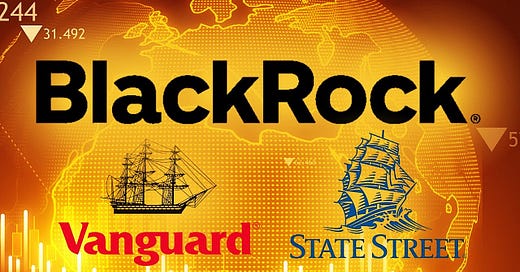“Whoever controls the money, controls the world.” Henry Kissinger
Now, unless you have been living in the hinterlands or the Hebrides for the last few years, you will have seen the names BlackRock, Vanguard and State Street come up in your newsfeeds and timelines. BlackRock, Vanguard and State Street are the three biggest index fund and asset management companies in the world today. They are sometimes to referred to as the biggest shadow banks currently in operation, they control trillions of dollars in assets in everything from energy, property, banking and finance, technology, food and a range of other markets. They are positioned between national governments, central banks and global policy makers like the IMF and the World Bank. Larry Fink, the chairman and founder of BlackRock, even sits on the boards of the WEF (the World Economic Forum) and the CFR (the Council on Foreign Relations) and is as recognisable as Jeff Bezos and Mark Zuckerberg in some circles. In the highly globalised world economy we have today, BlackRock, Vanguard and State Street have tremendous power and influence.
Origins
BlackRock, founded in 1988 by Larry Fink and seven partners, started as a risk management and fixed-income institutional asset manager. Over the decades, it has evolved into the world's largest asset manager, with $11.5 trillion in assets under management (AUM) as of 2024.1 BlackRock's growth has been fuelled by its innovative approach to risk management, notably through its Aladdin platform, which integrates sophisticated analytics and risk management tools. In five years, BlackRock went from being valued at just over $5m to $80 billion.
Founded in 1975 by John C. Bogle, Vanguard revolutionized the investment world with the introduction of the first index fund available to individual investors. Started in part as a response to the huge expansion in the U.S. Treasury market in the mid-70s, Vanguard's unique client-owned structure has enabled it to prioritize investor interests by minimising costs. With over $10.4 trillion in AUM, Vanguard remains a pioneer in passive investing, advocating for low-cost, diversified investment strategies.2
After BlackRock, Vanguard is the largest provider of mutual funds and ETFs (exchange- traded funds). Additionally, Vanguard offers brokerage services, educational account services, financial planning, asset management and trust services.
State Street Corporation traces its roots back to 1792, making it one of the oldest financial institutions in the United States. Initially established as a commercial bank, it transitioned into asset management in the mid-20th century. Today, State Street is a global custodian and asset manager, with approximately $4.7 trillion in AUM and over $46 trillion in assets under custody and administration according to Wikipedia.3
Investment Strategies and Philosophies
BlackRock: BlackRock's investment philosophy centres on diversification and risk management. The firm offers a broad spectrum of investment products, including actively managed funds, passive index funds and exchange-traded funds (ETFs). BlackRock is particularly known for its iShares ETF brand, which has become a dominant player in the global ETF market. The firm's commitment to technology and data-driven insights is exemplified by its Aladdin platform, which provides comprehensive portfolio management and risk analysis services to institutional clients.
State Street: State Street's investment strategy emphasizes stewardship and governance. The firm is a leader in promoting environmental, social and governance (ESG) criteria in investment decisions. Its SPDR ETF suite is widely recognized, especially the SPDR S&P 500 ETF, one of the largest and most liquid ETFs globally. State Street leverages its extensive custody and administration capabilities to offer a holistic approach to asset management, integrating fiduciary responsibilities with investment performance.
Vanguard: Vanguard's approach is rooted in low-cost, long-term investing. The firm advocates for broad market exposure through index funds and ETFs, helping investors achieve diversified portfolios with minimal expenses. Vanguard's client-owned structure aligns its interests with those of its investors, ensuring a focus on cost reduction and value creation. The firm's emphasis on passive investing has influenced industry standards, promoting the benefits of market-based returns over active management.
Market Dominance
BlackRock, State Street and Vanguard collectively manage assets worth more than the GDP of most countries. Their combined influence over global financial markets is unparalleled. These firms are the largest shareholders in nearly every major publicly traded company, including tech giants like Apple, Microsoft and Google, as well as industrial titans like ExxonMobil and General Electric. This concentration of ownership grants them significant voting power and influence over corporate governance. Consider the following:
Some have called the Big Three the world’s largest shadow banks and some have even gone as far as to say that these asset manager owns the world. BlackRock were hired to manage the government bailout of the big banks and other lending institutions during the 2008 crisis, even though BlackRock itself is a stakeholder in most of the financial institutions in question. Returning to Vanguard and their dominance in the ETF market briefly, they are predicted to beat the S&P 500 again this year and the Vanguard ETF has delivered a compound annual return of 13.6% since its inception in 2004.4
BlackRock holds shares in Wells Fargo, Bank of America and JP Morgan Chase & Co. and when the Federal Reserve made the unprecedented move of buying corporate bonds, BlackRock again was hired to oversee the process. As the table above illustrates, the Big Three own around 3 to 10 percent of shares in companies like Comcast, AT&T, Ford, Microsoft, P&G, Apple and many more. In fact, they have shares in companies around the world and their diverse portfolio includes assets in energy, property, technology, pharmaceuticals, banking, industry, oil and gas and more. Holding shares in this percentage range is called ‘passive investing’ and it affords them more privileges than they otherwise would get. Passive investing is when you buy a small amount of shares and just hold on to them, indefinitely. They own a small, yet sizable, stake in most listed corporations, this is called ‘universal ownership’. They profit at least a little bit out of every sector of the economy. Vanguard, BlackRock and State Street don’t own everything perse; they just own shares in most things.5
But that is not all because if you add the total amount of shares that BlackRock, State Street and Vanguard hold, the combined total is something like 20 to 25 percent in most companies, making them easily the majority shareholder in these entities. Additionally, the amount of stock you have determines the amount of votes you get and the Big Three are almost always in the top 3 of shareholders, from the chart above the only exception from that small list was Kraft Heinze as Berkshire Hathaway made the list there but BlackRock, Vanguard and State Street are the largest shareholders of Berkshire Hathaway anyway so, as our American friends often say, ‘go figure’.
Then there is the somewhat touchy subject of what is called ‘circular ownership’, this means that no one can own shares in BlackRock without BlackRock owning shares in them.
BlackRock’s advanced software, called ‘Aladdin’, with its highly sophisticated algorithm, is what really gives them a competitive edge in the market. ‘Aladdin’ actually stands for ‘Asset, Liability, and Debt and Derivatives Investment Network’ and it consists of 5,000 computers that BlackRock uses to monitor their clients’ activity and analyse their trading patterns. With this software, they are able to see potential gaps in the market or where something could go wrong.6 BlackRock’s Aladdin is like the eye of Sauron of finance and the only algorithm that can compare with Aladdin is Google’s own.
BlackRock makes their fees from the services they provide to their clients, not directly from the assets they manage, well not exactly (it’s complicated!). You see, there is a catch, the more those assets appreciate the more BlackRock collects in fees.
Then there is the question of competition in the economy. As the Big Three own stakes in most of the companies in each market, they operate as a defacto monopoly and are able to engineer prices and market conditions to their benefit. The five major airlines in the U.S., the major sports apparel brands and all the major banks have the same shareholders, as the owners are all the same, they coordinate together among each other and this undermines competition in the broader economy and is one reason for the high prices we experience.
The Big Three are making money out of every market and every area of the economy. And as if all of that wasn’t enough, the Big Three are all co-investors in one another. The biggest investors in BlackRock are Vanguard and State Street (along with BlackRock itself), the single biggest investor in Vanguard is BlackRock (followed by Vanguard) and finally the biggest investors of State Street are, drum roll please, BlackRock, Vanguard and State Street.7 Ultimately, asset managers are the shareholders of asset managers and they all own each other and this is true for a lot of high finance: each company owns a piece of their ‘competitors’, it’s like playing a game of Monopoly against yourself. As l mentioned previously, BlackRock, Vanguard and State Street don’t own everything, they just own shares in everything.
BlackRock, Vanguard and State Street are the top shareholders in 88% of the S&P 500, according to a 2017 Cambridge University report. 2024 Republican presidential nominee, Vivek Ramaswamy, has called them, “the most powerful cartel in human history.”
Now, it is time to put things into perspective. A few things need to be stated because when researching this subject some high-ranking articles and videos were spreading a lot of misinformation about this topic. Firstly, the funds they do control they don’t get to dictate where they are invested, that is the whole point of indexing, money invested follows the lead set by the market so BlackRock and Vanguard cannot, at least on a discretionary basis, pull stocks from one area and move them to another as they please. BlackRock don’t own the world and neither do Vanguard. But of course, this is something of a grey area because ‘controlling’, ‘powerful’ and ‘influential’ are all on the same spectrum and who is to say where their respective power and influence ends. Some have even stated that this ambiguity is itself a tacit extension of their power and influence, additionally few CEOs or board members sit on the table at the WEF and have - more or less - a direct line of contact to the President of the United States and Jerome Powell (the current Fed chair).8
BlackRock, State Street and Vanguard wield unprecedented, unrivalled influence over the global economy. Their strategies and philosophies have reshaped the investment landscape, promoting diversification, cost efficiency and long-term value creation. However, their dominance raises important questions about the concentration of power, ethical responsibility and systemic risk. As they navigate the complexities of the modern financial world, their actions will continue to shape the future of capitalism and global markets. Understanding the role and impact of these financial giants is essential for anyone seeking to comprehend the dynamics of contemporary finance and the economy broadly.
BlackRock's assets hit record $11.5 trillion amid private market push (2024) at: https://www.reuters.com/business/finance/blackrock-hits-record-high-115-trillion-assets-market-rally-etf-boost-2024-10-11/
Wikipedia contributors (2025) The Vanguard group. https://en.wikipedia.org/wiki/The_Vanguard_Group.
Wikipedia contributors (2025a) State Street Corporation. https://en.wikipedia.org/wiki/State_Street_Corporation.
Fool, M. (no date) 'Prediction: This unstoppable vanguard ETF will beat the S&P 500 again in 2025,' Nasdaq. https://www.nasdaq.com/articles/prediction-unstoppable-vanguard-etf-will-beat-sp-500-again-2025-2.
More Perfect Union (2024) BlackRock: The conspiracies You don’t know.
Bhandary, D. (2021) What is BlackRock Aladdin and How it manages $21 Trillion? https://startuptalky.com/blackrock-aladdin-portfolio-management/.
State Street Corporation at: https://fintel.io/so/us/stt#:~:text=Institutional%20Ownership%20and%20Shareholders,of%2038.10%25%20over%20that%20period.
The Plain Bagel (2023) Addressing the Blackrock/Vanguard situation.











Could they end up being broken up like the oil cartels were? Although I don't think that would get enough elite political support at the moment, unless Trump is feeling bullish! I wonder what the effects would be of a breakup?